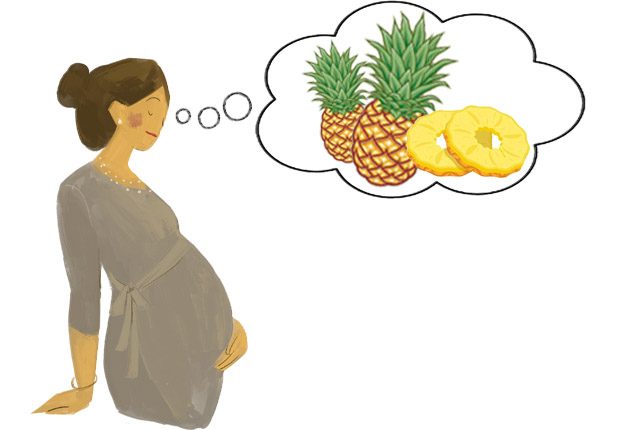💡 Updated on July 16, 2025 — We refreshed this post with new pregnancy-safe tips, updated guidance, and helpful answers.
Heard that pineapple can cause a miscarriage or bring on early labor? If you’re pregnant and love pineapple, that old wives’ tale might have you second-guessing your fruit bowl. But don’t give it up just yet, mama.

So, can you eat pineapple while pregnant? Yes — in most cases, pineapple is totally safe to enjoy during pregnancy, and it even offers some pretty sweet health benefits.
Still, like most things in pregnancy, it’s all about balance and understanding what’s actually true (and what’s not). In this article, we’ll take a closer look at the facts behind pineapple during pregnancy, including how much is safe, the real deal with bromelain, and why cravings might be trying to tell you something.
Let’s bust the myths, celebrate the benefits, and find out exactly how to enjoy this tropical fruit with peace of mind.
What’s In a Pineapple?
Before we dig into safety, let’s talk about why pineapple is so popular in the first place, besides its sunshine-in-a-bite flavor!

Pineapple is packed with:
- Vitamin C – supports immune health and helps your body absorb iron
- Vitamin B6 – supports baby’s brain development and reduces nausea
- Potassium – helps regulate blood pressure and fluid balance
- Fiber – keeps things moving (hello, pregnancy constipation!)
- Bromelain – a natural enzyme known for its anti-inflammatory effects
Pineapple in Pregnancy: Why It’s Safe and What You Should Know
Let’s break down why pineapple is considered safe, and what you should watch out for, especially when it comes to portion size, ripeness, and your own body’s reactions.
Despite the scary myths floating around, fresh, ripe pineapple is not only safe for most pregnant women — it can even be a healthy and refreshing part of your pregnancy diet. In fact, pineapple is rich in vitamin C, fiber, and natural enzymes that may support digestion and immunity.
There’s no scientific evidence showing that eating pineapple in normal food amounts causes miscarriage or triggers early labor. Those rumors mostly come from outdated or misinterpreted claims about bromelain (a natural enzyme found in pineapple — more on that later).
That said, pregnancy affects every body differently. Some moms-to-be may find that pineapple triggers heartburn or upsets their stomach, especially in larger amounts or when eaten on an empty stomach.
As with most things during pregnancy, balance is key. A moderate portion of ripe, fresh pineapple can be a safe and enjoyable way to satisfy your cravings, without stress or guilt.
Debunking Common Myths About Pineapple in Pregnancy
Even though pineapple is considered safe, some persistent myths continue to cause confusion. Let’s clear up a few of the most common ones:
🍍 Myth 1: Pineapple causes miscarriage
There’s no scientific evidence to support this. Moderate amounts of pineapple are completely safe and won’t increase miscarriage risk.
🍍 Myth 2: Pineapple induces labor
While bromelain sounds intimidating, the tiny amount in fresh fruit isn’t enough to trigger contractions, especially in the first or second trimester.
🍍 Myth 3: Pineapple causes heartburn
This one can be true for some! Pineapple is naturally acidic, and if your digestion is sensitive, it may lead to reflux. Try smaller portions or pair it with soothing foods like yogurt.
How Much Pineapple Is Safe During Pregnancy?
There’s no official daily limit, but most experts agree that 1 cup of fresh pineapple (about 4–8 ounces) is a reasonable and safe serving for pregnant women.
If pineapple has never caused issues for you before, it’s likely fine now. But if you’re prone to acid reflux, sensitive digestion, or allergies, it’s smart to start with a smaller portion and see how your body responds.
Tips for safe enjoyment:
- Choose ripe pineapple: Unripe pineapple tends to be more acidic and can be tougher on your stomach, so opt for ripe, juicy slices instead.
- Watch your pineapple juice intake: Drinking large amounts of pineapple juice in one sitting—especially during the first trimester—can increase acidity and cause digestive discomfort. Try to choose juice without added sugar and enjoy it in moderation.
- Sip slowly and in small amounts: Especially if you’re prone to gestational diabetes or acid reflux, taking small sips rather than gulping helps avoid blood sugar spikes and stomach irritation.
Listening to your body is always your best guide — and in most cases, there’s no reason to skip this juicy treat entirely.
Benefits of Eating Pineapple During Pregnancy
Craving pineapple during pregnancy might be your body’s way of asking for a boost of vitamins or hydration.
Potential health benefits of pineapple during pregnancy:
- Immune Support: Thanks to high Vitamin C content, pineapple helps fight off colds and boosts immunity.
- Better Iron Absorption: Vitamin C also helps your body absorb iron from plant-based foods.
- Natural Digestive Support: The fiber can ease constipation, which is super common during pregnancy.
- Mood & Nausea Support: Vitamin B6 is linked to brain health and may help reduce morning sickness.
- Healthy Hydration: It’s sweet, juicy, and hydrating—great for those “can’t drink enough water” days.
Are There Any Risks of Eating Pineapple During Pregnancy?
Pineapple is generally safe when eaten in moderation, but there are a few things to keep in mind:
- Digestive Upset: Eating too much at once may cause diarrhea, acid reflux, or cramping—especially if your stomach’s already sensitive.
- Allergies: Some people are allergic to pineapple. If you’ve had reactions before (itching, swelling, or hives), definitely skip it.
- Medication Interactions: Bromelain can slightly thin the blood, so if you’re taking blood thinners like warfarin, talk to your doctor first.
- Food Safety: Always wash and cut fresh pineapple properly to avoid mold or bacterial contamination.
As always, if you’re unsure about any food during pregnancy, check in with your healthcare provider, especially if you have a history of allergies or complications.
What Is Bromelain — and Should You Worry About It During Pregnancy?
You’ve probably heard that pineapple contains bromelain, a natural enzyme that some claim can soften the cervix or trigger contractions. That’s the root of many pineapple-related pregnancy myths.
While bromelain is present in fresh pineapple (mostly in the core), the amount is very small, and most of it is broken down during digestion. You’d have to eat several whole pineapples (core and all!) in one sitting to even come close to a potentially concerning amount.
So, unless you’re consuming pineapple in extremely large, concentrated amounts, bromelain from food is not considered dangerous during pregnancy.
However, pineapple supplements or bromelain pills are a different story…
Can You Take Pineapple Supplements While Pregnant?
Pineapple-based supplements are not recommended during pregnancy without guidance from your healthcare provider.
Here’s why:
- They often contain concentrated bromelain in amounts much higher than you’d get from eating fresh fruit.
- Bromelain in supplement form hasn’t been proven safe in pregnancy, especially in high doses.
- Supplements aren’t well-regulated by the FDA, so there may be inconsistent dosages or undisclosed ingredients.
Best Ways to Eat Pineapple During Pregnancy
Need a few mama-friendly ideas for enjoying pineapple without overdoing it?
Try these:
- Add fresh chunks to a fruit salad or smoothie
- Pair it with Greek yogurt for a calcium-rich snack
- Grill pineapple slices for a delicious side dish
- Blend it with mint and coconut water for a refreshing mocktail
- Use frozen pineapple in smoothies to soothe nausea
💡 Stick with fresh or frozen pineapple when you can. Canned versions often come in syrup, which adds unnecessary sugar.
Key Takeaways: Is Pineapple Safe During Pregnancy?
💛 Yes, you can eat pineapple while pregnant and it can be a healthy, delicious part of your prenatal diet.
⚠️ Just remember to have it in moderation. Also, avoid unripe or underwashed fruit, and steer clear of supplements unless approved by your doctor.
